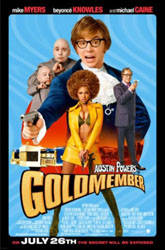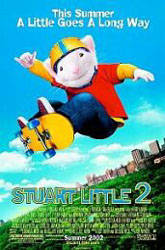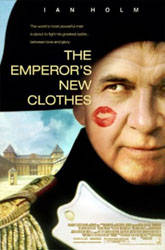 Director: Starring:
OTHER REVIEWS: CQ Meet the
Parents Undercover
Brother The
World Is Not |
Austin Powers in Goldmember BY: DAVID PERRY When the first Austin Powers film came out in 1997, the International Man of Mystery was an anomaly in a series of painfully unfunny spoofs plaguing much of the 1990s. Leslie Nielsen and the ZAZ Team were at their lowest points (a valley they seem to still be living at) and, following Spy Hard, the idea of a spy spoof couldn't have seemed more uninteresting. Then director Jay Roach and writer/star Mike Myers dropped the bomb on America, a pitch-perfect comedy that included occasional moment of potty humor and, more importantly, a true love for the James Bond/Derek Flint/Harry Palmer world they were spoofing. Even when pulling the dumbest ideas for gags ever (an Irish hit man with lucky charms?), there was so much enjoyment in the delivery that it was impossible to not feel part of the joke. Part of this was missing the second time around as the Spy Who Shagged Me tried desperately to reuse most of the first film's best jokes to mixed response. The gross-out comedy was upped and the spoofing was tapered to the point that what was on the screen was less a continuation of the previous film and more a response to its surprise success (as is unfortunately true with most sequels). The third film, Austin Powers in Goldmember, continues this counter-development of the Austin Powers saga, even choosing to nix the title tradition: no longer is this an Austin Powers film with a subtitle, but now a film that happens to include an appearance (albeit large) by Austin Powers. Catching a glimpse of this film's title (what was wrong with Austin Powers: Goldmember?), I could only remember that Disney recently released a movie that began with "Peter Pan in Return to Neverland." But, despite loosing all real interests in doing anything new with thier material, Myers and Roach have pained to find a way to at least keep these jokes from becoming stale. In some moments they do fail, but for the most part they do a splendid job revamping some of the older jokes (especially a magnificent resurrection of the shadow-play sequence from The Spy Who Shagged Me that far surpasses the original). The title refers to a notorious 70s super-villain named, of course, Goldmember (Myers) after a freak smelting accident caused the loss of his genitalia. The Dutchman has various little quirks -- he loves to find uses for his double-jointed body and regularly snacks on his own peeling skin -- but there's really nothing funny about him. Somehow the screenplay includes enough Dutch jokes to make his character almost seem worthwhile, but not quite enough to merit the screen time he takes away from others. In the process they lose sight of what was so much fun about secondary characters like Number Two (Wagner) and Frau Farbissina (Sterling). These were two of the finest characters in both of the previous films and now their material has been relegated to a couple comments early in the film and then single lines interjected occasionally. In addition to Goldmember, the screenplay relegates too much time to Scott Evil (Green) and the so-three-years-ago Fat Bastard (Myers). The dry periods of the film nearly kill the movie's first half (following a terrific opening that plays with the gargantuan Austin Powers marquee value), but there are enough strong jokes to make Austin Powers in Goldmember worth seeing. There may be a painful three-minute rap sequence and a tedious six-minute prep school flashback, but there's also a stronger use of Mini-Me (Troyer) throughout the duration of the film. Even if the Powers character has lost much of the spy-spoof
persona, there are a few reminders of where the films came from beyond the toying with
Bond villain Auric Goldfinger. Michael Caine, donning his Harry Palmer glasses, saunters
into the film and gives it the needed kitsch factor for his momentary appearances. But,
alas, Myers seems to have lost sight of the fact that the franchise has lost its touch on
the original joke and gives little material to the 60s icon to play with (in fact, more
time was probably spent rewriting the song "Alfie" for the closing credits than
was spent writing for Caine himself). This is a glaring problem for any fan of the
original and its precursors: Myers may have forgotten what he had been doing, but we
certainly haven't. |





